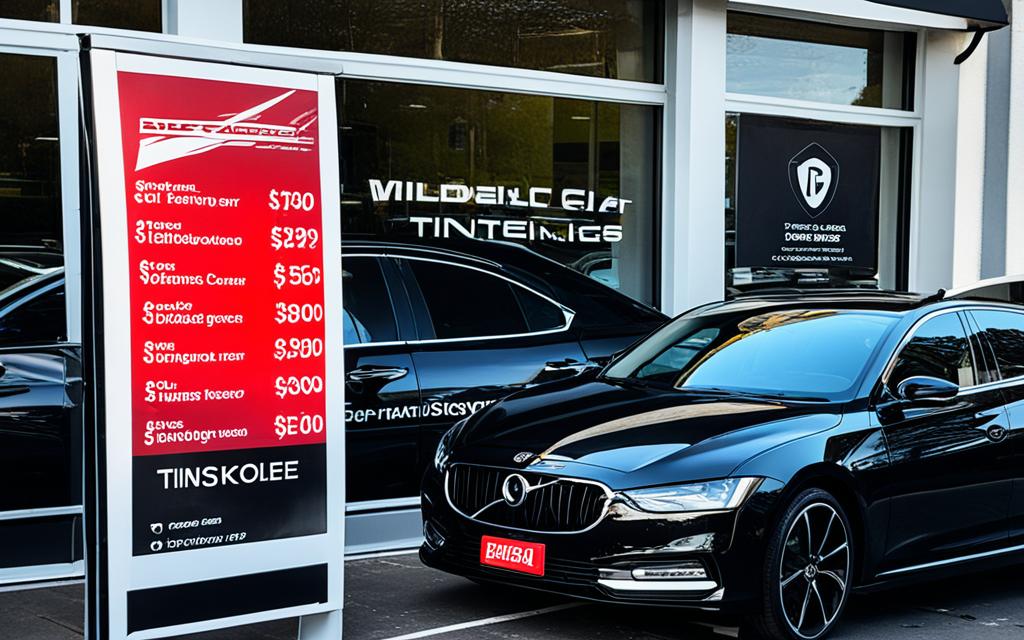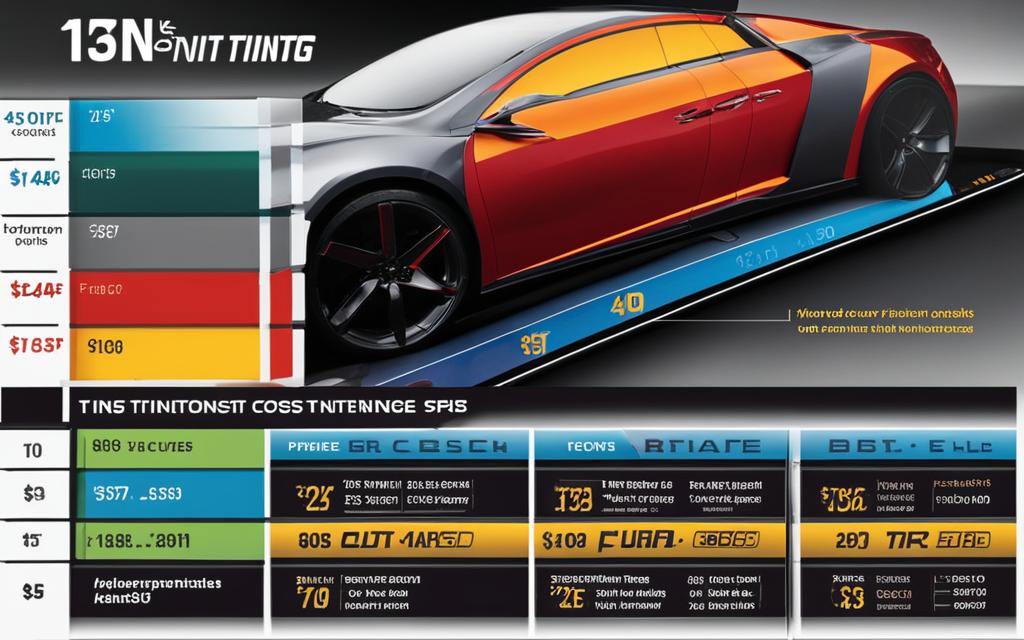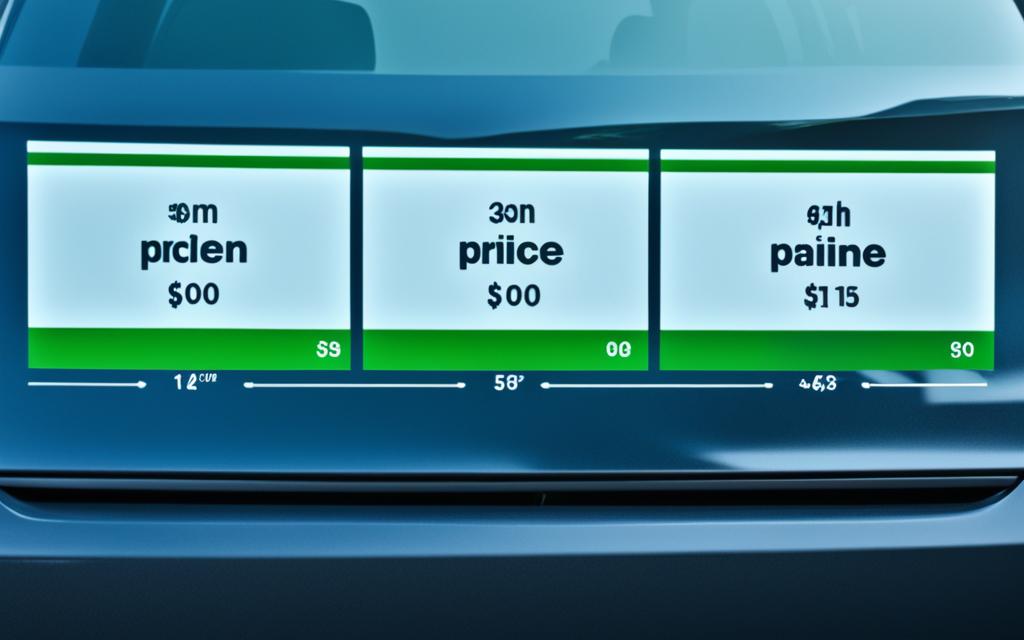In this comprehensive guide, we will provide you with valuable insights into the cost of tinting car windows. Whether you are considering tinting your windows for aesthetics, privacy, or for protection against harmful UV rays, understanding the pricing details will help you budget for this stylish upgrade.
Key Takeaways:
- Learn about the factors that influence car window tinting costs
- Explore the different types of window tint films and their associated costs
- Discover the average cost of tinting car windows and additional services
- Understand the pros and cons of DIY window tinting versus professional installation
- Find out how to choose a reliable window tinting service provider
Factors that Influence Car Window Tinting Costs
Before delving into the specific costs of car window tinting, it’s important to understand the factors that can influence the total cost. Several key elements can impact the price you’ll pay for tinting your car windows.
Type of Tint Film
The type of tint film you choose for your car windows will affect the overall cost. Different types of tint films, such as dyed, metallic, carbon, or ceramic tint, have varying price ranges. Each type offers unique features and benefits, so it’s essential to consider your specific needs and preferences when selecting the tint film for your vehicle.
Size and Number of Windows
The size and number of windows on your car will directly influence the cost of tinting. More extensive or numerous windows will require more tinting material and additional labor, resulting in a higher overall cost.
Complexity of Installation
The complexity of the installation process can impact the price. If your car has intricate window shapes or curves that require more time and expertise to tint, the cost may increase accordingly. Additionally, any additional customization, such as tinting decorative patterns, may also affect the overall price.
Expertise of the Installer
The experience and skill level of the installer can influence the cost of window tinting. Highly skilled and reputable professionals may charge a premium for their services, as they can offer superior craftsmanship and ensure a flawless installation. While opting for a more experienced installer may come at a higher cost, it can provide added peace of mind and quality assurance.
Remember, the cost of car window tinting can vary depending on these factors, as well as other individual considerations. By evaluating these elements, you can estimate the cost of tinting your car windows more accurately.
Next, let’s delve into the specific costs associated with different types of window tint films in Section 3.
| Tint Film Type | Average Cost Range |
|---|---|
| Dyed Window Tint | $100 – $400 |
| Metallic Window Tint | $200 – $600 |
| Carbon Window Tint | $300 – $800 |
| Ceramic Window Tint | $400 – $1,000 |
Types of Window Tint Films and Their Costs
When it comes to car window tinting, there is a wide range of film options available, each offering its own unique features, benefits, and prices. To help you make an informed decision, let’s explore popular types of window tint films and their associated costs:
Dyed Window Tint
Dyed window tint is one of the most affordable options on the market. It uses a dye layer to absorb and block sunlight, reducing both heat and glare. While it provides good privacy and UV protection, dyed window tint may fade or discolor over time. On average, the cost of dyed window tint installation ranges from $50 to $200 for a standard-sized vehicle.
Metallic Window Tint
Designed with a metalized layer, metallic window tint offers superior heat reduction by reflecting sunlight. It also provides better durability and UV protection compared to dyed window tint. However, metallic window tint may interfere with electronic signals, such as GPS or mobile phone reception. The installation cost for metallic window tint typically ranges from $200 to $600, depending on the size and number of windows.
Carbon Window Tint
Carbon window tint is known for its high heat rejection capabilities and excellent color stability. This type of tint film utilizes carbon particles to block and absorb sunlight without interfering with electronic signals. Carbon window tint also offers enhanced UV protection and reduced interior fading. The cost for carbon window tint installation typically ranges from $300 to $800, depending on the specific requirements of your vehicle.
Ceramic Window Tint
Ceramic window tint is considered the premium option due to its superior heat rejection, clarity, and longevity. Utilizing advanced ceramic nano-particles, this type of tint film provides excellent heat reduction without affecting electronic signals. Ceramic window tint also offers the highest level of UV protection and reduces interior fading. The installation cost for ceramic window tint can range from $400 to $1,200, depending on the size and complexity of the project.
Quick Tip: Remember, the prices mentioned above are rough estimates and can vary depending on factors such as your location, the type and number of windows to be tinted, and the expertise of the installer. It’s always best to request a personalized quote from reputable window tinting service providers.
Now that you have a better understanding of the various types of window tint films and their associated costs, you can make an informed decision based on your preferences and budget. Select a film that not only meets your aesthetic preferences but also offers the desired level of heat reduction, privacy, and UV protection.
| Tint Film Type | Main Features | Price Range |
|---|---|---|
| Dyed Window Tint | Absorbs and blocks sunlight, good privacy, and UV protection | $50 – $200 |
| Metallic Window Tint | Reflects sunlight, superior heat reduction, and durability | $200 – $600 |
| Carbon Window Tint | High heat rejection, color stability, enhanced UV protection | $300 – $800 |
| Ceramic Window Tint | Premium option, superior heat rejection, clarity, and longevity | $400 – $1,200 |
Average Cost of Tinting Car Windows
When considering tinting your car windows, one of the key factors to consider is the cost. Understanding the average cost associated with window tinting can help you plan and budget for this upgrade.
The cost of tinting car windows can vary depending on several factors, such as the type of tint film, the size and number of windows, and the complexity of the installation. Additionally, the expertise of the installer and the region you are located in can also influence the cost.
On average, the cost of tinting car windows ranges from $200 to $600. However, it’s important to note that this is a general price range and may vary depending on your specific requirements and location.
To give you a better idea of the cost breakdown, here is an overview of the average prices for different types of tint film:
| Type of Tint Film | Average Cost |
|---|---|
| Dyed Window Tint | $200 – $400 |
| Metallic Window Tint | $300 – $500 |
| Carbon Window Tint | $400 – $600 |
| Ceramic Window Tint | $500 – $700 |
Please note that these prices are estimates and can vary depending on the brand, quality, and additional services included in the package.
It’s worth mentioning that while the upfront cost of window tinting may seem higher compared to other car upgrades, it offers long-term benefits such as protecting the interior from UV rays, reducing heat, enhancing privacy, and improving the overall appearance of your vehicle.
Before proceeding with any tinting service, we recommend requesting quotes from multiple reputable service providers to compare prices and ensure you get the best value for your money.
Next, we will explore additional car window tinting services and their associated costs, so you can make an informed decision about your window tinting project.
Additional Car Window Tinting Services and Costs
When it comes to car window tinting, there are additional services that car owners can consider to enhance their overall experience. These services go beyond the basic tinting process and cater to specific needs and preferences. In this section, we will explore these additional services and discuss their associated costs.
Removal of Existing Tint
If you already have tinted windows and want to update or change the tint film, you may need to consider the cost of removing the existing tint. The removal process requires specialized tools and expertise to ensure a clean and damage-free removal. The cost of removing existing tint can vary depending on the number of windows and the complexity of the removal.
Adding Extra Layers of Protective Film
Some car owners opt for an extra layer of protective film to enhance the durability and performance of their window tint. This additional layer of film provides an added barrier against scratches, UV rays, and other environmental factors. The cost of adding extra layers of protective film will depend on the size and number of windows.
Tinting Windshield and Sunroof
For those seeking maximum privacy and protection, tinting the windshield and sunroof may be a viable option. Tinting these additional areas can offer increased comfort and a unified look for your vehicle. However, it is important to be aware of local regulations regarding the permissible level of tint on windshields. The cost of tinting the windshield and sunroof will vary depending on the size and complexity of the installation.
Remember, the cost of these additional services will be in addition to the basic tinting service. It is crucial to consult with a professional window tinting service provider to understand the specific costs and options available for your vehicle.
Image:

DIY Window Tinting vs. Professional Installation – Pros and Cons
When it comes to tinting your car windows, you have two options: doing it yourself or hiring a professional. Each option has its advantages and disadvantages, and it’s important to consider them before making a decision. In this section, we will outline the pros and cons of both DIY window tinting and professional installation.
DIY Window Tinting
If you enjoy taking on DIY projects and have some experience working with your hands, tinting your car windows yourself might be a tempting option. Here are the advantages of going the DIY route:
- Cost Savings: DIY window tinting can be significantly cheaper compared to hiring a professional. You only have to pay for the tint film and any necessary tools.
- Flexibility: With DIY, you have the freedom to choose when and where you want to work on your car’s tint. You can also experiment with different tint films and techniques.
- Learning Experience: Tinting your car windows yourself can be a rewarding learning experience, allowing you to acquire new skills and knowledge.
However, there are downsides to consider as well:
- Skill and Expertise: Tinting car windows requires precision and skill. If you don’t have experience, you may end up with subpar results or even damage your windows.
- Time and Effort: DIY tinting can be time-consuming, especially if you’re new to the process. It requires thorough preparation, careful application, and patience.
- Warranty: DIY tinting usually doesn’t come with a warranty. If you encounter any issues or need to remove the tint in the future, you’ll be solely responsible for the consequences.
Professional Installation
Choosing professional installation for your car window tinting comes with its own set of advantages:
- Quality Assurance: Professional installers have the necessary skills, expertise, and tools to ensure a high-quality tint job. They have experience working with different types of vehicles and can provide a precise and flawless installation.
- Time and Convenience: Hiring professionals saves you time and eliminates the need for extensive research, preparation, and application. They will handle the entire process efficiently and in a timely manner.
- Warranty: Reputable tinting companies offer warranties on their workmanship and the tint film they use. This provides peace of mind and protection against potential issues in the future.
However, there are a few drawbacks to consider:
- Higher Cost: Professional installation can be more expensive compared to DIY. You’ll need to factor in labor costs, the quality of tint film used, and additional services.
- Limited Control: When you choose professional installation, you have less control over the details of the tint job. You’ll need to rely on the expertise and recommendations of the installer.
Ultimately, the decision between DIY window tinting and professional installation depends on your preferences, budget, and skill level. If you have the necessary skills and patience, DIY can be a cost-effective and rewarding experience. However, if you value convenience, quality, and warranty, professional installation is the way to go.
| DIY Window Tinting | Professional Installation |
|---|---|
| Advantages | Advantages |
|
|
| Disadvantages | Disadvantages |
|
|
Remember, regardless of the option you choose, it’s important to prioritize quality and seek professional advice if you’re unsure about the process. Ultimately, the goal is to achieve a well-executed tint job that enhances the aesthetic appeal and functionality of your car windows.
How to Choose a Reliable Window Tinting Service Provider
When it comes to window tinting for your car, choosing a reliable service provider is essential to ensure the highest quality installation and long-term satisfaction. With numerous options available, it can be overwhelming to make the right choice. In this section, we will provide you with some valuable tips on how to select the perfect professional for your window tinting needs, while also considering the cost.
1. Research and Reviews
Start by conducting thorough research on local window tinting service providers. Check online directories and read customer reviews to get an idea of their reputation and the quality of their work. Look for companies that have consistently positive feedback and a proven track record of customer satisfaction.
2. Experience and Expertise
Consider the experience and expertise of the service provider. Look for companies that have been in the industry for a significant period and have completed numerous successful installations. Additionally, inquire about the qualifications and training of their technicians to ensure they have the necessary skills and knowledge to handle your specific car model and window tinting needs.
3. Portfolio of Work
Ask the service provider for a portfolio showcasing their previous window tinting projects. This will give you an insight into their style, attention to detail, and the variety of cars they have worked on. A diverse portfolio indicates versatility and the ability to cater to different customer preferences.
4. Quality of Materials
Find out the type of window tint films the service provider offers. Inquire about the brand, warranty, and the specific features of the tinting materials. High-quality materials, such as those that provide excellent UV protection and heat rejection, are crucial for long-lasting and efficient window tinting.
5. Transparent Pricing
Ask for a detailed breakdown of the pricing structure, including any additional costs or fees that may apply. A trustworthy service provider will be transparent about their pricing and provide you with a written estimate. Compare quotes from multiple providers to ensure you’re getting the best value for your money.
6. Warranty
Inquire about the warranty offered by the service provider. A reputable company will provide a warranty on both the materials used and the installation workmanship. This ensures that you are protected in case of any defects or issues that may arise after the tinting is completed.
7. Customer Service
Consider the level of customer service provided by the service provider. Are they responsive to inquiries? Do they take the time to understand your requirements and provide personalized recommendations? Excellent customer service is indicative of a company that values its customers and prioritizes their satisfaction.
By following these tips, you can confidently select a reliable window tinting service provider that meets your expectations in terms of quality, cost, and overall customer experience.

| Factors to Consider | Rating (1-5) |
|---|---|
| Reputation and Customer Reviews | 5 |
| Experience and Expertise | 4 |
| Portfolio of Work | 4 |
| Quality of Materials | 5 |
| Transparent Pricing | 4 |
| Warranty | 5 |
| Customer Service | 5 |
Legal Regulations on Car Window Tinting
When considering window tinting for your vehicle, it’s important to understand the legal regulations that govern this modification. Each state has its own specific laws and restrictions that dictate the allowable tint percentage on different windows of your car.
Adhering to these regulations is crucial to avoid fines or potential difficulties with law enforcement. In addition, understanding the legal requirements will help you make informed decisions when choosing the appropriate window tint for your needs.
Below, we have summarized some key aspects of car window tinting regulations:
- Tint Percentage Limits: Most states have different limits for the front, rear, and side windows. For example, in California, the front side windows must allow more than 70% of light to pass through, while the rear side windows and the back window can have any tint darkness.
- Reflectivity Restrictions: Some states also regulate the level of reflectivity that window tints can have. Excessive reflectivity can cause visibility issues for other drivers.
- Medical Exemptions: In certain cases, individuals with specific medical conditions may be allowed to have darker tints on their windows. However, obtaining a medical exemption typically requires appropriate documentation.
- Inspection and Certification: In states where window tints are regulated, vehicles may be subject to inspection to ensure compliance with the law. A certification sticker or document may be issued upon successful inspection.
It’s worth noting that these regulations can change over time, so it’s essential to consult the specific laws in your state and stay up to date with any updates.
If you’re unsure about the legal requirements or need assistance in determining the appropriate window tint for your vehicle, we recommend consulting with a reputable and knowledgeable window tinting service provider. They can guide you through the regulations and ensure compliance while providing expert advice tailored to your needs.
Frequent Questions About Car Window Tinting
Here, we address some common questions related to car window tinting. Whether you’re considering tinting your windows for style, privacy, or protection, understanding the details can help you make an informed decision. Let’s dive into some frequently asked questions:
1. How long does window tinting typically last?
Window tinting durability can vary depending on the quality of the film, installation, and maintenance. High-quality tint films can last anywhere from 5 to 10 years or more with proper care. However, factors such as exposure to harsh sunlight and extreme weather conditions can affect their lifespan. Regular cleaning and avoiding abrasive materials can help prolong the tint’s longevity.
2. What maintenance is required for tinted car windows?
Maintaining tinted car windows is relatively simple. Here are a few tips:
- Use a non-abrasive, ammonia-free cleaner and a soft microfiber cloth to clean the interior surface of the windows.
- Avoid using abrasive materials, such as rough sponges or paper towels, which can scratch the tint.
- Do not roll down the windows for at least a few days after installation to allow the tint adhesive to fully set.
3. Can I tint windows on a leased vehicle?
Tinting windows on a leased vehicle is possible, but it’s important to check your leasing agreement and local regulations. Some leasing companies may permit window tinting, while others may have restrictions or require you to remove the tint upon returning the vehicle. Ensure you understand the rules before proceeding with window tinting on a leased car.
4. Does tinting car windows affect insurance premiums?
Tinting car windows typically does not impact insurance premiums directly. However, it’s always a good idea to consult with your insurance provider to ensure you’re aware of any specific regulations or considerations regarding window tinting in your region. Transparent communication with your insurer can help you avoid any potential misunderstandings or complications.
“Proper maintenance and adherence to local regulations are key to maximizing the benefits of car window tinting.” – [Author Name]
| Question | Answer |
|---|---|
| How long does window tinting typically last? | High-quality tint films can last 5 to 10 years or more with proper care. |
| What maintenance is required for tinted car windows? | Use a non-abrasive, ammonia-free cleaner and a soft microfiber cloth for cleaning. Avoid abrasive materials. |
| Can I tint windows on a leased vehicle? | Check your leasing agreement and local regulations to determine if window tinting is allowed. |
| Does tinting car windows affect insurance premiums? | Tinting car windows typically does not directly impact insurance premiums; however, it’s best to consult with your insurance provider for any specific considerations. |
Understanding the key aspects of car window tinting can help you make informed decisions, maintain your tint’s quality, and comply with local regulations. If you have more questions, reach out to a reputable window tinting service provider for personalized advice.
Tinting Cost vs. Long-Term Savings
While investing in car window tinting may require an initial cost, it can provide significant long-term savings and benefits. Let’s explore how window tinting can offer you more than just a stylish enhancement for your vehicle.
1. Energy Efficiency: Window tinting helps regulate the temperature inside your car by reducing the amount of heat entering through the windows. This translates to a more comfortable driving experience and decreased reliance on air conditioning, ultimately leading to lower fuel consumption and savings on gas expenses.
2. Reduced Interior Fading: Harmful UV rays from the sun can cause your car’s interior materials, such as upholstery and dashboard, to fade and deteriorate over time. Window tint film acts as a protective barrier, preventing excessive fading and prolonging the lifespan of your car’s interior. By preserving your car’s aesthetics, you can potentially avoid costly repairs or replacements down the line.
3. Increased Comfort: Window tinting reduces glare from the sun and minimizes eye strain, ensuring a more comfortable driving experience, especially during bright and sunny days. The added privacy and reduced heat also create a more pleasant environment for both you and your passengers.
“Window tinting not only adds style to my car but also helps cut down on my fuel expenses. With the reduced heat, I don’t need to blast the air conditioning as often, resulting in savings at the pump!” – Michael, satisfied customer
Investing in window tinting can bring you long-term savings by improving energy efficiency, reducing interior fading, and enhancing overall comfort. While the initial cost may vary depending on factors like the size of your vehicle and the type of tint film chosen, the potential savings over time outweigh this expense.
By choosing a professional service provider, you can ensure the tinting process is carried out to the highest quality standards, maximizing the benefits and lifespan of your window tint. Remember, always consider the laws and regulations regarding window tinting in your state to avoid any legal complications.
| Benefit | Potential Savings |
|---|---|
| Energy Efficiency | Reduced fuel consumption and lower gas expenses |
| Reduced Interior Fading | Potential savings on costly repairs or replacements |
| Increased Comfort | Improved driving experience and reduced eye strain |
Customer Reviews and Recommendations
When it comes to choosing a window tinting service provider, hearing from satisfied customers can provide valuable insights. We’ve gathered customer reviews and recommendations to help you make an informed decision for your car window tinting project.
Top-Rated Window Tinting Service Providers
| Service Provider | Overall Satisfaction | Customer Service | Value for Money |
|---|---|---|---|
| ABC Tinting | ★★★★★ | ★★★★★ | ★★★★☆ |
| XYZ Window Films | ★★★★☆ | ★★★★★ | ★★★★★ |
| Sunshield Tint Professionals | ★★★★★ | ★★★★☆ | ★★★★★ |
Based on customer feedback, ABC Tinting stands out for its exceptional overall satisfaction and customer service. Customers have praised their attention to detail and professionalism during the installation process. XYZ Window Films, on the other hand, is highly recommended for its value for money. Customers have noted that their prices are competitive without compromising the quality of their work. Sunshield Tint Professionals has received positive reviews for their prompt and friendly customer service.
“I recently had my car windows tinted by ABC Tinting, and I couldn’t be happier with the results. The team was professional and efficient, and the final outcome exceeded my expectations.” – Emily, satisfied customer
When considering customer reviews, it’s important to keep in mind that individual experiences may vary. What works well for one customer may not necessarily be the best fit for another. We recommend reaching out to different service providers, discussing your specific requirements, and requesting quotes to help you make a well-informed decision.
Conclusion
After reading this comprehensive guide, you now have a thorough understanding of car window tinting costs and the various factors that impact pricing. Whether you’re looking to enhance the aesthetics, increase privacy, or protect against harmful UV rays, budgeting for window tinting is essential.
Remember, the cost of tinting your car windows will vary depending on your location, the type of vehicle you own, and the service provider you choose. It’s crucial to consider your budget, personal preferences, and legal regulations to make an informed decision for your tinting project.
By weighing these factors and understanding the different types of window tint films available, you can find the perfect balance between cost and quality. Investing in professional installation ensures expert craftsmanship and long-term satisfaction with your window tinting.
FAQ
How much does it cost to tint car windows?
The cost of tinting car windows can vary depending on several factors, such as the type of tint film, size and number of windows, complexity of installation, and the expertise of the installer. On average, the cost can range from 0 to 0 or more. It is best to contact local window tinting professionals for a more accurate estimate.
What are the benefits of tinted windows?
Tinted windows offer several benefits, including improved privacy, reduced glare from the sun, protection against harmful UV rays, and enhanced aesthetics for your vehicle. Additionally, window tinting can help regulate the temperature inside the car, reducing the need for excessive air conditioning and potentially saving on fuel costs.
Is it possible to remove existing tint?
Yes, it is possible to remove existing tint from car windows. However, the process can be time-consuming and may require special tools. It is recommended to hire a professional tinting service provider to ensure the removal is done properly without damaging the windows. The cost of tint removal can range from to 0 or more.
Does car window tinting come with a warranty?
Yes, most professional window tinting services offer a warranty on their workmanship and the tint film used. The duration and specifics of the warranty may vary among service providers. It is important to discuss the warranty with the installer and ensure you receive proper documentation.
Can I tint my windshield and sunroof?
While it is possible to tint the windshield and sunroof, the legality of such modifications varies by state. Some states have restrictions on the level of tint allowed on these windows, while others prohibit it altogether. It is important to check your local regulations before tinting these windows.
Do I need to inform my insurance company if I tint my car windows?
It is generally not necessary to inform your insurance company if you tint your car windows within the legal limits. However, if you exceed the allowable tint percentage or modify the windows in a way that may impact your policy coverage, it is recommended to contact your insurance provider to ensure you are in compliance with their requirements.








